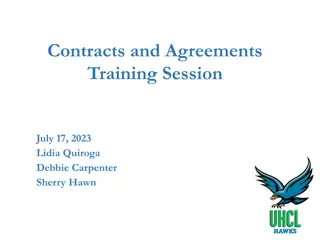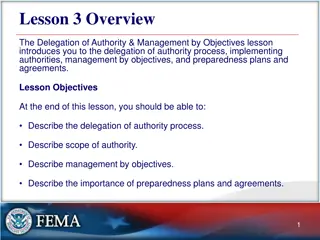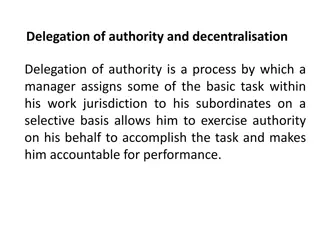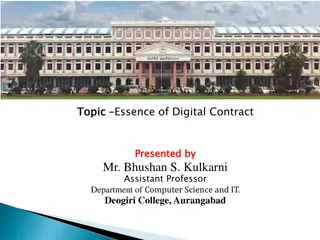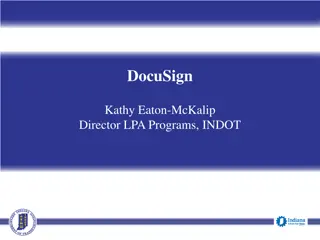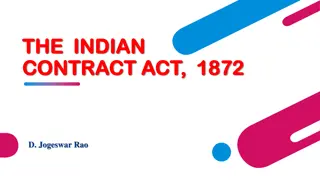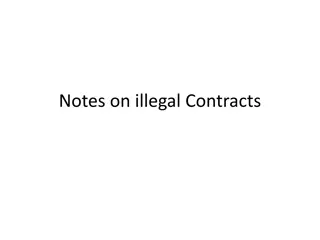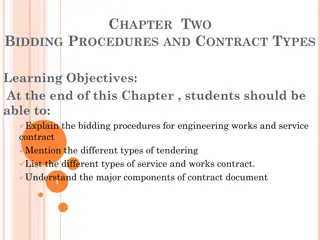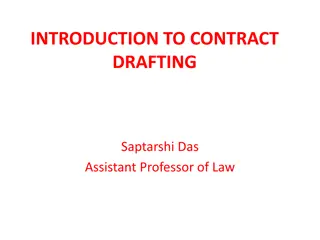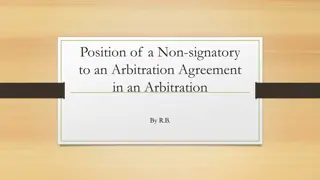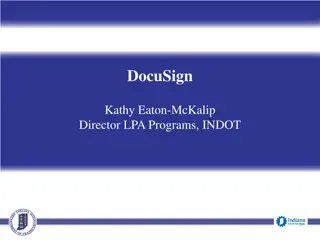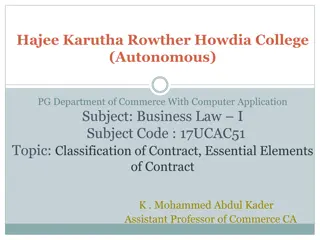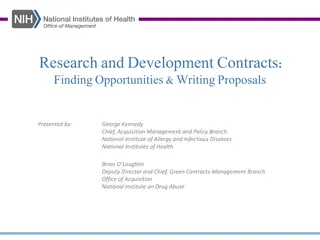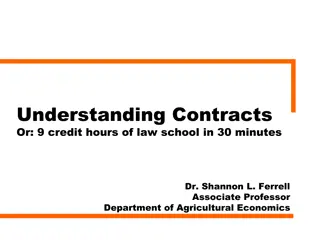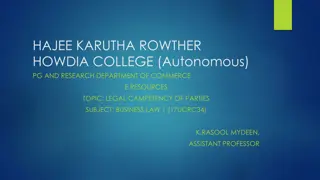Understanding University Contracts: Procedures and Signatory Authority
Learn about the importance of contracts at universities, including what constitutes a university contract, who can sign them, where to send contracts for review, and the role of waivers and releases in university dealings. Understanding these processes is essential for efficient and compliant contract management within academic institutions.
- University Contracts
- Signatory Authority
- Contract Management
- Procurement Process
- Waivers and Releases
Download Presentation

Please find below an Image/Link to download the presentation.
The content on the website is provided AS IS for your information and personal use only. It may not be sold, licensed, or shared on other websites without obtaining consent from the author. Download presentation by click this link. If you encounter any issues during the download, it is possible that the publisher has removed the file from their server.
E N D
Presentation Transcript
Contracting at the University
What is a Contract? An agreement with specific terms between two or more persons or entities in which there is a promise to do something in return for a valuable benefit known as consideration. The vehicle that drives the vast majority of University dealings. Software Equipment Events Athletics Housing Food/Vending
What is a University Contract? Form contracts for the University can be found on Procurement s Website Forms should always be used when we are able. This will greatly reduce the turnaround time for agreements. The subject of using a form University contract should be broached with vendors before selecting them. If you are deciding between two vendors who can offer roughly the same services at roughly the same price, go with the one that will use the our form contract. The University cannot agree to just any contract term, including several industry standard terms. Any purchase of a good or service must be routed through Procurement for proper review. Free or at cost.
Who can Sign University Contracts? University signatory authority is found in University Policy BF4008 Contracts and Signatory Authority All business officers and those in charge of ordering or approval for your department should know this policy The President has delegated authority to individuals to sign contracts on behalf of the University. The Director of Procurement will sign agreements for any purchase of goods and services less than $250,000.00. The VP for Sponsored Programs has unlimited authority to sign agreements that fall within its purview. The Provost can sign agreements such as faculty employment contracts, exchange agreements and study abroad agreements.
I Have a Contract Where do I Send It? Any contract for the purchase of goods and services should go directly to Procurement, and they will assist in the processing of the contract. These contracts should not come to legal first. Procurement will determine if the contract requires legal review. Contracts that are grant based or research based should go to the Office of Sponsored Programs Other non-procurement agreements should come directly to legal for review and processing for signature. This includes: Memorandums of Understanding Study Abroad Agreements Exchange Agreements Make sure agreements are vetted and approved within Division prior to sending for signature and/or legal review, especially for business terms.
Waivers and Releases What are They? A waiver or release gives up a right, such as releasing one from his/her liability for harm or damage that may occur from performing under a contract, or participating in an activity. Form waivers and releases can be found on the Office of Legal Counsel Website. If you are not sure if your activity or event can be sufficiently covered by one of these forms, please contact our office for assistance.
Waivers and Releases When to Use Them Waivers and releases are required when we have individuals participating in a University sponsored event. This includes things like camps, field trips, etc. In any event where another party is hosting an event on campus, waiver language must be included in the contract to release the University from liability in the event of an accident or other damage causing event.
Waivers and Releases Special Situations Media/Image Release Anytime you wish to take pictures of other persons for use in research, program or other University publications, you must obtain a media/image release from those individuals photographed This release does not release the University from liability, rather it is a grant of right by the individual to the University to use their likeness in materials without compensation
Research/Sponsored Programs Contracts
Examples of Research Contracts Sponsored Research Agreements (Fixed Price vs. Cost Reimbursable) Service Agreements Confidentiality/Non-disclosure Agreements Material Transfer Agreements Data Transfer Agreements Licensing and Other IP Agreements Purchase Orders w terms and conditions Subcontracts
Differences Between Grants and Contracts In the context of sponsored projects, a contract defines specific rights and obligations of the contracting parties with regard to matters such as research results and deliverables, publication rights, inventions, public dissemination of results, and liability. A grant generally provides greater discretion than a contract in the conduct of the sponsored project activity, and provides less specificity in the intended outcome of the activity. Some sponsors may refer to unrestricted gifts as grants, . However, the specific requirements outlined in the agreement are what distinguishes the funding to be a gift or a grant.
Limitation on UofMs Ability to Accept Contract Terms: State Law TN Attorney General s Rules TBR Provisions University s Research Mission Federal Law
State and Federal Laws- Financial Conflicts of Interest This is a complex topic, beyond the scope of this presentation, but it is an important issue. Companies associated with UofM faculty or staff may seek to sponsor research or collaborate with university researchers. Such conflicts must be evaluated by Research Compliance. Related activities may run afoul of university policies, federal regulations, and state criminal laws that govern self dealing. The University s Research Compliance office handles all matters related to human/animal subject research, IRB, FCOI, Export Controls, etc.
Common Contract Terms We Cannot Agree To Indemnification: If the sponsor gets sued, UofM will have to provide their legal defense. Limitation of Liability: The contract will say that UofM cannot sue the sponsor for damages. Governing Law: The contract (as well as any potential litigation) will be governed by the law of a state other than Tennessee. Consent to Jurisdiction: The contract will say that any potential lawsuits must be brought in a court in a state other than Tennessee. Binding Arbitration: The contract will say, in the event of a dispute, we must submit to a binding arbitrator s ruling.
UofM Misssion The University of Memphis is a learner-centered metropolitan research university providing high quality educational experiences while pursuing new knowledge through research, artistic expression, and interdisciplinary and engaged scholarship.
UofM Mission - Conflicts Sponsored Projects contracts can clash with the University s mission in a variety of ways, including: - Restricting ability to publish research results - Requiring conduct of confidential research - Assigning ownership of intellectual property rights and data
UofM Mission - Publication Sponsors and Collaborators often seek the right to approve publications resulting from research. Problem: Conflicts with the University s support of the rights of academic freedom, which promote faculty, staff, and students carrying out their scholarly work in an open and free atmosphere and publish research results without restraint. Giving a sponsor approval over publications effectively gives that party an opportunity to prohibit publication. A sponsor s contract right to review a publication to protect IP rights and confidential information has to be carefully worded.
UofM Mission Data Ownership Sponsors/collaborators often request ownership of data arising from research. Agreeing to such language in a contract raises several policy/legal issues: - Assigning ownership of data may prevent publication. - Data may be needed should publication be challenged or in the event allegations of research misconduct arise. - University may have an obligation to provide other third parties, like the federal government, access to data.
UofM Mission - Confidentiality In addition to TN Open Records Act Implications, confidentiality obligations can conflict with UofM s Research Mission by preventing faculty and students from publishing research results. That said, we routinely enter into non-disclosure agreements with sponsors so that faculty and sponsor can discuss potential projects without fear of disclosure.
Federal Law Bayh-Dole Act (Intellectual Property) Sponsors/collaborators often seek ownership of (or rights to) inventions arising from University research. Bayh-Dole Act allows the UofM to elect title to patents arising from federally funded research. Granting ownership or rights to UofM intellectual property can create a conflict if there are multiple funding sources that contribute to the IP. A conflict can arise if a research contract gives a sponsor ownership of or preferential rights to an invention arising from the research, where some part of the invention is conceived in the course of federally funded research. Under Bayh-Dole Act, the University can elect ownership of inventions created in federally funded research, but must grant license rights to the federal government.
Federal Law- Tax Issues (UBIT) Tax exempt organizations such as the UofM are subject to Unrelated Business Income Tax (UBIT) on income from any trade or business that is regularly carried on by the entity that is not mission-related. There is a broad exception for research, but the exception would not cover most fee-for-service, facility use, or routine testing agreements. Activities that lead to UBIT aren t bad, just taxable- and need to be reported as such.
Intellectual Property in General As a general rule, IP should be treated the same for all agreements, following inventorship: -What university faculty staff and students invent should belong to the UofM -What a sponsor or collaborator invents should belong to the sponsor or collaborator. -Jointly developed inventions should be jointly owned.
Where to Go from Here? Before negotiating any type of research agreement with a potential sponsor or collaborator, contact the Office of Sponsored Programs (Ty Flores) or the Office of Tech Transfer (Hai Trieu), or the Office of Legal Counsel (David Cooley). Note: All research contracts should be signed by Jasbir Dhaliwal. Other faculty, staff or students are not authorized to sign on behalf of the University. Any liability that results from a contract not signed by a University signatory may be personally assignable to whoever signs the contract. The contract may also be deemed void and unenforceable.
Procurement and Contract Services
Policies and Procedures The University of Memphis Policies and Procedures Contract and Agreements is Policy No. BF4007 The University s Signatory Policy is located at Policy No. BF4008
CONTRACT sERVICES Contract Review and Approval Process Summary The following guidelines apply to all contracts (expenditure, non-expenditure, and revenue generating) or agreements (hereinafter referred to as contracts) between The University of Memphis and any external party.
Contract Amount Contracts of $5,000 or more require the approval of the Director of Procurement Services. All proposed contracts of $10,000 or more must be competitively bid unless adequate sole source justification is provided.
Authorized Signatory Approval for University Contracts Executive Director of Procurement and Contract Services President signs contracts of $250,000 plus Prior approval of the Fiscal Review Committee is required on all non- competitive (i.e., sole source ) contracts of $250,000 or more, and for a term greater than one (1) year. This process requires at least 75 calendar days prior to the effective start date.
WARNING! If you sign a contract on behalf of the University and do not have the authority to do so, you may be personally liable. So, when in doubt ASK FIRST!
Contract/Agreement Routing Form A completed and authorized Contract/Agreement Routing Form must accompany ALL contracts or amendments/addenda to contracts and routed directly to the appropriate university office. Contract/Agreement Routing Form All proposed contracts shall be approved by all parties prior to the effective date.
Contract Routing Form List of Contracts and Approvals Expenditure & Standard University Contracts are initially reviewed and signed by Procurement Services (678-2265) and may not require additional time for review by the Office of Legal Counsel. Expenditure Contracts- An approved on-line purchase requisition must be entered into the Banner Finance, and the requisition number must be listed on the Contract/agreement Routing Form . Standard University Contracts-The contractor should sign first and then the Procurement Service Director will sign the document. Vendor-generated contracts are initially reviewed by Procurement and will require additional time for review by the Office of Legal Counsel. Vendor generated Contracts-The Procurement Services Director will sign first. Funds will be obligated with a purchase order and fully executed copies of the contract and purchase order will be distributed to all parties by Procurement Services.
CONTRACT ROUTING CONT Specific non-standard contracts (i.e., real property leases, partnerships, performance agreements) are initially reviewed by Business Services (678-2307). All other non-standard contracts (memorandum of understanding, business associates, etc.) are initially reviewed by the Office of Legal Counsel (678-2155).
CONTRACT STATUS Contracts in review by Procurement Services are available online. Contracts will be listed on the Contract/Agreement Routing Status Report by your department name. Contracts status can also be viewed on the University of Memphis website listed by contract number: http://itweb2.memphis.edu/legal/contracts_index.ph p?yearRange=09
STATUS REPORT EXPLANATION Vendor/Supplier Name Requisition/Contract Tracking Number: A number signed by all contracts reviewed by Procurement. Department Submitting Contract Date Received: This is the date Procurement receives the contract. Under Review: Once a contract is received by Procurement, it goes through a process of review to ensure compliance with University and Tennessee Board of Regents policies.
CONT. In Negotiations: After the contract is reviewed, it is sent to the vendor with Amendments for its acceptance or rejection. The contract terms are negotiated during this phase. Awaiting Final Signatures: After all terms are negotiated, the Vendor and University will sign the contract. Date Closed: The date the contract has received all signatures and has been returned to Procurement Services.
Contract Monitoring In accordance with the requirements of the contract monitoring statute TCA 12-4-109(d) and Finance and Administration Rules 0620- 3-8 regarding management of service contracts, the University of Memphis is required to have a Contract Monitoring Plan. Contract Monitoring Form
Contract Monitor The Contract/Agreement Routing Form has been revised to require a monitor, along with the frequency of checks by the monitor to be specified when submitting a contract to Procurement for review. The monitor must have sufficient authority and expertise to identify and take action when contract problems arise. After approval of the service contract, a Contract Monitoring Form will be returned, along with the approved contract and purchase order, to the person specified as the contract monitor on the Contract/Agreement Routing Form. The Contract Monitoring Form should be used to document service provider compliance with the terms and conditions of the contract and maintained in the files of the departmental contract monitor for audit purposes. The final responsibility for administering, reviewing and documenting the performance of each service contract for cost- effective and results remains with the department procuring the service. The appropriate University departmental official shall be responsible for monitoring, compliance, expiration, and approving the contractor s invoice for payment of services.
Final Thoughts If you have a question check to see if there is an applicable University policy or procedure (available online): http://policies.memphis.edu/ Use common sense If all else fails: Call Us [Insert Procurement Contact info]
Impermissible Clauses Hold Harmless/Indemnification by State of TN. Governing law/jurisdiction Disclaimers of liability and/or limitations on amount or types of damages that the state may recover. Disclaimers of express or implied warranties. Limitation on time within which State may bring suit. No termination date. Contract remedies beyond actual damages. Binding Arbitration Clauses Provision requiring confidentiality in violation of the TN Open Records Act Provision Requiring Commercial Insurance
Impermissible Clause- Indemnification The University should never accept a clause that would indemnify a contractor from liability. Indemnification is an agreement that the University accept resulting liability or loss regardless of fault. Indemnification shifts risks of damages from sponsor to the University. Accepting an indemnification clause is a problem because: The Tennessee Attorney General s Office has issued a number of opinions holding that the hold harmless/indemnification agreements that call for TN to assume the risk of loss to another party are void and unenforceable. State entities do not have the authority to enter into indemnification agreements on behalf of the State. The TN AG s office defends only state entities (including the UofM) and is not authorized to defend a non-state entity.
Impermissible Clause - Governing Law and Jurisdiction The University cannot agree to be subject to the governing law of any jurisdiction other than the State of Tennessee. Doing so is deemed a waiver of sovereign immunity and the University does not have authority for such waiver. While the TN AG s Office could waive sovereign immunity, the UofM does not have the authority to do so. The UofM can therefore only agree to TN law/jurisdiction or to remain silent on governing law jurisdiction in a contract.
Impermissible Clause - Limitations of Liability Generally, the University cannot agree to limit a contractor s liability to any less than 2 times the value of the contract. The chief procurement officer may approve a limitation for less than 2 times the contract value if the limitation of liability amount is necessary to prevent harm to the state from failing to obtain the goods or services sought or from obtaining the goods or services at a higher price.
Impermissible Clause - Warranties While not wholly impermissible since 2014, it is in the University s best interests to not limit the warranties allowed to the University.
Impermissible Clause Time Limits on Filing Suit The University cannot agree to any time limit imposed by a contractor for which the University could file suit. Agreeing to this would be a waiver of sovereign immunity Only the State legislature can determine how the State can be sued. The Tennessee Claims Commission is the appropriate jurisdiction for contract disputes between a contractor and the State.
Impermissible Clause - Term/Period of Performance The term of the Agreement must be clearly defined in the contract. Typically, the University will not agree to a term longer than five years for an expenditure agreement and a term of ten years for a revenue agreement. The Director of Procurement may allow exceptions to these rules if it can be shown that it is in the best interest of the University to do so.
Impermissible Clause -Contract Remedies The extent to which the state can be held liable for contract damages is statutorily limited to actual damages. This means the University cannot agree to pay things such as attorney s fees, punitive damages, liquidated damages, penalties, or other expenses other than court costs. Claims against the University should be submitted to the TN Claims Commission. The University cannot agree to automatic injunctive relief, but can agree to allow a contracting party to seek such relief from a court The TN Claims Commission will not hear injunctive relief claims, so it is important to be sure that the relief must be sought from a TN court.
Impermissible Clause - Arbitration Clauses The TN Attorney General s Office has the authority to enter into a settlement agreement on behalf of the state. Therefore, the University cannot agree to binding arbitration in lieu of litigation. The University can, however, agree to non-binding mediation.
Impermissible Clause Confidentiality and Non-Disclosure The University cannot agree by contract to keep records confidential if the UofM is required by law to disclose those records. Typically, the University can agree to protect information supplied by a third party only if it is identified as confidential at the time of the disclosure and it constitutes a trade secret under state law. The Umiversity can never agree to keep confidential the terms of an agreement or the existence of an agreement or research (or any other type of) relationship.


